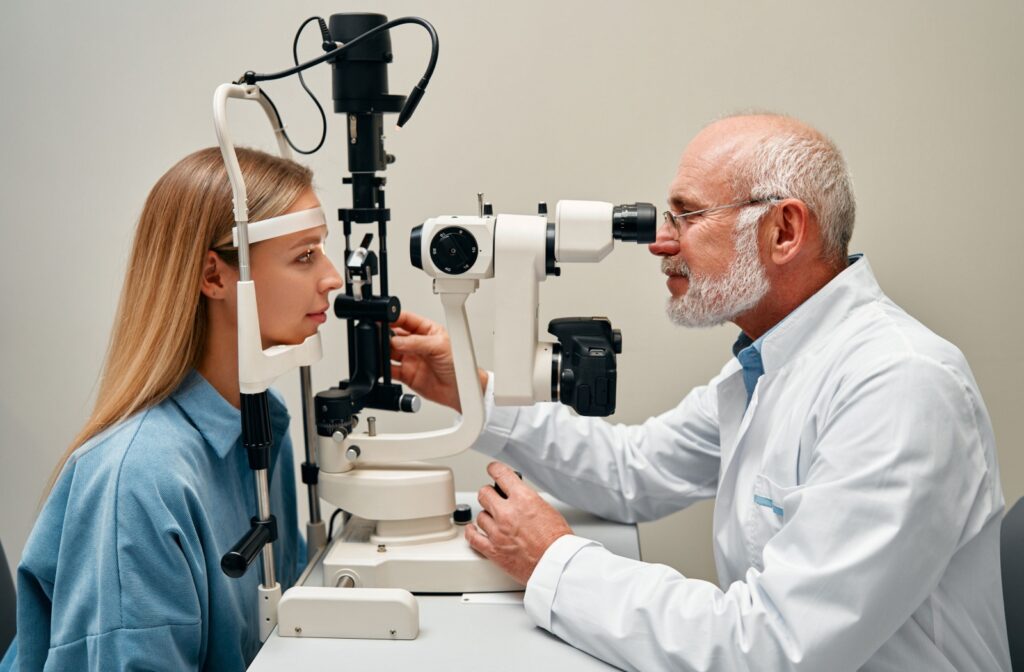Yes, you can get an eye exam while pregnant. Not only can you get an eye exam while pregnant, but you should get an eye exam. Hormonal changes during pregnancy can impact the entire body, including your eyes and vision. So while there are many doctors to see during pregnancy, don’t forget your optometrist!
Pregnancy is complicated, there’s no way around it. However, being proactive with eye health can help you feel more comfortable and confident while staying ahead of any changes that could affect your overall well-being.
The Importance of Eye Exams During Pregnancy
Scheduling an eye exam during pregnancy is about more than just updating your prescription. Your eye health reflects your overall health, and an eye exam can help detect potential vision problems early. Try to stay ahead of these changes, especially since some conditions can impact both you and your developing baby.
For example, gestational diabetes can lead to changes in your eyes, and high blood pressure during pregnancy may increase risks related to your vision. By visiting an eye care professional, you’re taking a proactive step to monitor and protect a vital part of your health.
How Pregnancy Affects Vision
Pregnancy is a time of rapid changes in your body, and your eyes are no exception. Many people notice some temporary vision changes during pregnancy, and understanding these shifts can help you manage them.
Dry Eye
Hormonal fluctuations during pregnancy often reduce tear production, which can leave your eyes feeling dry, scratchy, and irritated. In many cases, these changes are usually temporary—though they can still be frustrating.
Artificial tears are usually safe to use during pregnancy and can provide relief from dry eye symptoms
Blurry Vision
Some experience minor shifts in their vision during pregnancy as fluid changes affect the shape of the cornea and increase intraocular eye pressure.
These changes are generally temporary, but it’s still worth discussing them with an eye care professional to make sure you’re comfortable and staying safe, especially if you wear corrective lenses.
Increased Light Sensitivity
Pregnancy can make your eyes more sensitive to light, making it harder to feel comfortable in bright settings. Wearing sunglasses with UV protection can help reduce discomfort and protect your eyes.
Diabetes & Vision
For those managing gestational diabetes or pre-existing diabetes, pregnancy can sometimes cause diabetic retinopathy—damage to the blood vessels in the retina. Regular eye exams during pregnancy can help monitor and manage this risk.

What to Expect During an Eye Exam
Eye exams during pregnancy generally follow the same standard procedure as any other eye exam. However, it’s helpful to know beforehand what to expect so you can plan accordingly. Here’s what your visit might look like:
- Comprehensive eye health evaluation: Your eye doctor may start by asking about any symptoms or changes in your vision and general health. They’ll consider pregnancy-specific conditions that could influence your eye health.
- Vision test: This step assesses your visual acuity and checks whether your current glasses or contact lenses are still the correct fit for you.
- Eye pressure check: One unexpected side effect during pregnancy is increased pressure inside your eye. Using tools like tonometry, your optometrist can check that the pressure is within a healthy range. This test is especially used if you’re at risk for conditions like glaucoma.
- Retinal exam: Your optometrist can examine the back of your eyes for any signs of swelling, damage, or other irregularities.
The majority of standard tests are generally considered safe during pregnancy, but be sure to inform your doctor about your pregnancy to address any concerns you might have.
Tips for Maintaining Healthy Vision During Pregnancy
While some vision changes are expected during pregnancy, there are steps you can take to stay comfortable and support your eye health.
- Stay hydrated: Drinking plenty of water helps maintain moisture levels in your body, which can reduce the effects of dry eye.
- Use artificial tears: Safe, preservative-free artificial tears can offer relief if your eyes feel dry or uncomfortable.
- Protect your eyes: Use sunglasses with UV protection to shield your eyes from excessive sunlight and prevent light sensitivity.
- Eat a balanced diet: Include foods rich in vitamins and minerals—such as leafy greens, carrots, fish, or nuts—that promote overall eye health.
- Rest your eyes: If you spend a lot of time looking at screens, practice the 20-20-20 rule. Every 20 minutes, look at something 20 feet away for 20 seconds to reduce digital eye strain.
When to Consult Your Optometrist
While vision changes during pregnancy are usually mild and temporary, some symptoms warrant prompt attention. Consult your optometrist if you notice any of the following:
- Sudden or severe vision changes (e.g., blurry vision or blind spots)
- Persistent eye pain or discomfort
- Swelling or redness in the eyes does not improve
- Flashing lights or floaters in your vision
These symptoms could indicate conditions like preeclampsia, diabetic retinopathy, or retinal detachment, which require immediate medical attention.
Support Your Vision During Pregnancy—and Beyond!
Taking care of your vision while pregnant is a part of supporting your overall health. With regular eye exams, practical vision care tips, and prompt attention to any unusual changes, you can take proactive steps to manage potential changes and make the most of this exciting chapter of life.
At Restore Vision Center, our team understands the health needs that come with pregnancy and is here to help you protect your vision every step of the way. Our friendly, knowledgeable eye care professionals are ready to offer personalized care tailored to you. Book your appointment today and take the next proactive step in your wellness journey—because caring for your eyes is an important step toward maintaining clear vision!




